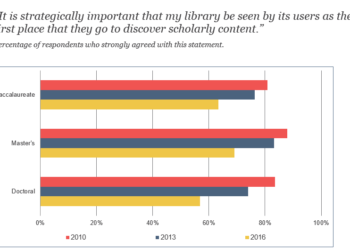Editor’s Note: Today’s post is by Heather Staines. Heather is Head of Partnerships for the MIT Knowledge Futures Group, building open infrastructure for researchers, libraries, and publishers. Originally an academic, she has two decades of experience in scholarly communications, working with both books and journals at publishers and vendors.
From May 8 to 10th of this year, about two hundred librarians, publishers, and all flavors in between gathered at Simon Fraser University (SFU) in Vancouver for the 6th annual Library Publishing Coalition Forum. The Pre-Conference on Wednesday, May 8th, focused on Open Educational Resources, had about 90 attendees. The open theme carried over into the main event with presentations on open publishing platforms of many kinds.
Increased interest in open platforms and open tools has grown after continuing industry consolidation of hosting and authoring tools — namely, Wiley’s acquisition of the Atypon platform and the latter’s subsequent purchase of the Authoria and Manuscript tools, along with Elsevier’s shift in emphasis on the researcher workflow with acquisitions of the Mendeley Scholarly Collaboration Network, Aries’ Editorial Manager, and the institutional repository provider, Bepress. Many posts here in the Scholarly Kitchen have focused on this trend and highlighted concern of vendor lock-in, as well as smaller publisher concerns of being “locked out.”

Landscape Scan
With so many open platforms in the mix today, one focal point of the meeting was SFU’s own John Maxwell, who presented preliminary findings from an environmental scan of open source publishing conducted by MIT Press and funded by the Andrew W. Mellon Foundation. (Full disclosure: I currently work for the MIT Knowledge Futures Group, but I had agreed to present at this meeting while still employed by the open annotation tool creator Hypothesis.)
With a full report scheduled for later this summer, Maxwell detailed the scope and process of the scan, which hopes to create a catalog of approximately 50 open source projects itemized with their main approaches, key partners, codebases, and more. John, who is Associate Professor and Director of the Canadian Centre for Studies in Publishing and the graduate Publishing Studies Program at SFU, is himself a researcher focused on the history of publishing technologies, the evolution of scholarly communication, and the history of computing.
This background enables him to approach the results of the scan with a unique perspective, examining what is meant by “open source,” software as infrastructure, and the growing role of third-party service providers, including both academic libraries and private-sector hosting and integration companies, in online dissemination of scholarly content. His presentation covered platforms that employ both HTML-first and JATS XML approaches to content hosting, addressing issues around legacy content and the role such platforms play in the review and editorial workflow.
Maxwell touched briefly on the challenges of sustainability, both in funding and in scalability, as well as the complex variety evident in existing projects. Projects to be included in the report will range from more established initiatives such as Open Journal Systems (OJS), university-supported projects such as Fulcrum, Manifold, PubPub, and Janeway, as well as different publisher supported models, such as eLife and Hindawi, which utilize the Collaborative Knowledge Foundation’s workflow modules. Anyone wishing to get an overview into the space will likely find this forthcoming report to be a good starting point.
A Plethora of Sessions
This conference was one of the rare events when I find myself wanting to go to nearly all the sessions. I found this to be the case in 2018 as well, which was one reason I was so keen to return. (Many talks were live-streamed via Twitter.) Even though I’ve been exploring the open platform space for the last year, presenters often detailed projects and new approaches with which I was less familiar. These included projects by presses, scholar-led initiatives, collaborative efforts, and member/mission-driven ventures. Because I’ve seen many presentations by the higher profile publication platforms, I selected sessions to maximize my learning. I’ll highlight just a few of these initiatives here.
- Pressbooks (Steel Wagstaff, Educational Client Manager): Pressbooks is an open source book platform that faculty can use to create textbooks, open educational resources, monographs and other materials. They work with more than sixty partners, including universities and publishers to enable branded sites with education-specific features, like Single Sign On and LMS integration.
- MAVs Open Press (Michelle Reed, UT Arlington’s Open Educational Librarian): A platform for the publication of open access journals and books, MAVs hosted on the OJS platform. Its focus is in the gray space of the intersection of course materials dissemination and preservation. Their web presence is maintained on the Pressbooks site.
- Aperio (Dave S. Ghamandi, Open Publishing Librarian and Aperio Journals Managing Editor, University of Virginia Library) is a joint project between the University of Virginia (UVA) Library and the University of Virginia Press with editorial support and production services provided by Ubiquity Press. Their intention is to help create Open Access journals that reflect the fields of study at UVA, with a particular focus on the interdisciplinary space, non-traditional research, and underserved communities.
- punctum books (Eileen Joy): An independent, non-profit, and scholar-led publisher, punctum is dedicated to “radically creative modes of intellectual inquiry” with a special focus on works that fall between traditional book length and journal article length. As long as a work makes a unique contribution, punctum is less concerned about form or format. Neither are they focused on a need to scale, enabling “micro-presses.”
- eScholarship (Justin Gonder, Senior Product Manager, Publishing,California Digital Library ): A project of the California Digital Library (CDL), eScholarship is both an Institutional Repository and a Publisher. On the publishing side, they offer scholars with a University of California affiliation an open access publication platform for journals and books. CDL is currently partnering with the University of California Press and the Collaborative Knowledge Foundation to develop a book production workflow tool Editoria.
- PubPub (Catherine Ahern, Knowledge Futures Group) PubPub is an open source publication platform for books, journals, and more, managed by the MIT Knowledge Futures Group, a collaboration between the MIT Press and the MIT Media Lab. The particular project highlighted in this session was <strong> Ideas, a hybrid print and open access book series that looks at “the effects of digital technology on culture, business, government, education, and our lives.” The series, which receives generous support from the MIT Libraries, has three published titles and another currently available for open peer review.
- Coalition Publi.ca (James MacGregor: Public Knowledge Project; Davin Baragiotta, Érudit): This cross-Canada collaboration supports social sciences and humanities journals in the transition towards open access. Using the Public Knowledge Project’s OJS on the backend and the Érudit hosting platform, Coalition Publi.ca will also conduct research projects to increase understanding of Canadian academic publishing.
Lest you think that the whole meeting was about platforms, never fear! There were excellent sessions on digital preservation, metadata, standards, and copyright. Something for everyone!
Best Business Meeting Ever?
This is the first time that I’ve attended an industry event when non-members were invited not only to sit in on the business meeting but also to participate in an interactive discussion and report back. Each table was invited to reflect on the question: Why does the library publish and how does this fit with other services?
The conversation evolved in a number of different directions. Libraries publish to empower researchers or provide an outlet for non-traditional research outputs like datasets. They publish to ensure that research is not trapped in proprietary systems which could own the data and potentially violate user privacy. They publish as part of a social justice mission–to do what needs to be done! And, my favorite, because publishing is fun. It is a creative process with a tangible outlet. (Hey, I’m a publisher by training, you don’t need to convince me of that!)
Closing Plenary
The final session was equally energizing. Remarks from the panel (Melanie Schlosser, Library Publishing Coalition; Nicky Agate, Columbia University; Dave Ghamandi, University of Virginia; Inba Kehoe, University of Victoria) were framed around a number of prompts: Lessons Learned/Moving Forward; Professionalization; Balancing Values and Prestige; and Theory/Praxis.
Attendees didn’t shy away from the tough issues. In our quest to build capacity, are we currently too Balkanized, duplicating services? What if new forms of publication simply reward traditional forms of publication and perpetuate global inequalities? Has tool development outpaced culture? Numerous suggestions were made. Let’s look to Latin American and Canadian examples. Let’s continue to inject discussion of values and value-based discussion in the University Press community. Let’s concentrate now on changing hearts and minds and increasing investment in people. Thoughts on progress were varied. Can we not see the progress because we are right in the middle of it? Or, as a social movement, are we right where we need to be — at the grassroots level?
If you’ve not attended — or not even considered attending — the Library Publishing Coalition Forum, you should reconsider. There is considerable activity and energy in this space of which commercial publishers and vendors should be aware. The LPC and its Forum have, in a short time, done much to promote best practices, increase the promotion of diverse voices, and supported each other to advance the mission of library publishing.
Discussion
1 Thought on "Guest Post — Library Publishers Convene in Vancouver to Discuss Open Platforms and Open Educational Resources"
This is a great recap of the event. Now I feel like I was part of the meeting because of the very informative synopsis provided. Thank you for sharing.



